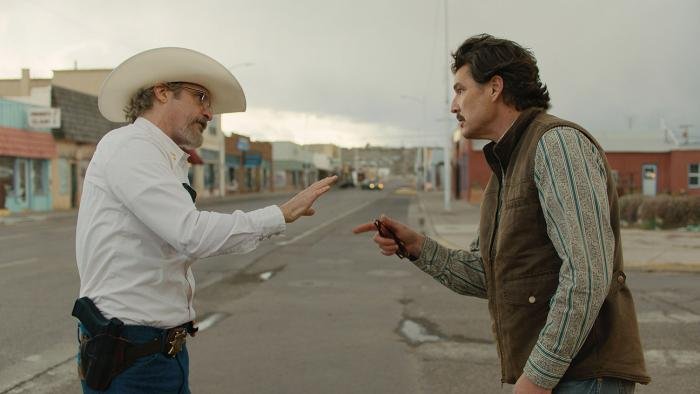You know something’s touching a nerve when a fight almost breaks out in the middle of a critic’s screening, which is usually one of the more staid environments to watch a movie in. And so it went with my second viewing (one viewing is definitely not enough) of Ari Aster’s Eddington, another successful provocation from the madman filmmaker behind Hereditary, Midsommar, and Beau is Afraid. And while it didn’t quite lead to critical fisticuffs, when somebody laughed during a let’s say inopportune moment in the film, some furious words were most definitely bandied about. And the tension that had already been pouring off the screen shoved its way right out into the audience and sat down amongst us. Spread-eagled, raring to go. Yippee-ki-yay, et cetera.
The thing is Eddington, Aster’s COVID-era Neo-Western starring Joaquin Phoenix and Pedro Pascal, is very much an awkward laugh kinda movie. So while I personally wasn’t laughing at the exact pitch-black moment that gave my fellow critic that inappropriate snort, I did feel for them as they came under fire—I certainly don’t think Aster would’ve been irritated by it. Much the contrary. Every opportunity Aster has here to take an easy path sees him tossing us and the story down the side of a cactus-strewn hillside instead. And the difficult, thorny film that results from that deranged practice is all the better for it.
Yet Eddington might somehow also be Aster’s most straightforward and accessible film to date, too. At least on its surface. There are none of those Satanic cults of elderly suburbanites forcing Mom to saw her own head off; none of those Swedish ritual killings perched high above hallucinatory bleached-white cliffs. And certainly none of the schizoid Freud-fucking entanglements of Beau. Eddington is set more or less in the world as we know it, and it is tackling the real-world politics of the past five years.
Politics that have, one must concede, been far more bonkers than anything Beau Wasserman could’ve stumbled upon, shrieking up in his mother’s attic. The real world has impossibly caught up, insanity-wise, to Aster—machine gun battles on Main Street are basically Neorealism nowadays.
So we open in the Spring of 2020 (we’ve all been dying to go back there, I know) in a fictional small town in New Mexico that sits parasitically on the backside of the Navajo Nation. (There’s a lot of sly commentary on our genocidal history littered about Eddington, culminating in a sight-gag involving Geronimo’s bones that I daren’t spoil.) Phoenix plays Eddington’s Sheriff Joe Cross, a gentle-seeming white-hat whose time is already full up wrangling two deputies (Michael Ward and Luke Grimes), a shell-shocked wife named Louise (Emma Stone, giving her big glassy eyes a real workout), and a conspiracy-chugging mother-in-law (the always great Deirdre O’Connell, aka The Penguin’s mom). On top of that, now he’s got a deadly plague knocking at the door too, threatening to send everybody flying off the deep end. Harumph! What’s a good guy to do?
Before we allow ourselves too far down that lane, let’s make one thing clear—Sheriff Joe is not a good guy. (The fact that Aster named his Southwestern Sheriff “Joe” should probably clue people into that fact straight away.) But Joe sure fancies himself one—he’s convinced he’s on the right side of history, fighting for decency and kindness and all of our personal freedoms. So he rips his face mask off and tells his townspeople to do the same! And then he starts running for mayor too, because the town’s liberal Mayor Garcia (Pedro Pascal) is enforcing that dastardly masking. Or is it because Garcia briefly dated his wife when they were teenagers? It’s awfully hard to tell.
Cuz the thing is, Aster keys the film into Joe’s self-mythologized hero’s journey to a painful degree. The movie—if we can’t feel our way toward the black humor under it all, anyway—forces us to marinate in Joe’s poisoned mindset for its two hours and twenty-five minutes. On the surface, it’s all neighborly concern—Joe’s just yearning for a purer world. (One that never was—the sick history of the previous Sheriff slash family patriarch fills in those gaps a’plenty.) But do marvel at how easy it becomes for sociopathy to start steering the ship as Joe’s better angels develop horns.
The tensions arise in how excruciatingly (complimentary!) Aster chooses to frame his telling of this story. It’s all much more about presenting our problems than it is about offering us any real solutions to them. It’s a madcap diagnosis of derangements—Eddington is confrontational, aggressively so, and often makes for a painfully uncomfortable sit. It takes some honest effort to wind your way through its byzantine provocations toward the laughs buried deep down under its too-close-to-home horrors. And then if you do laugh, you’ve got to worry about Raisinets flying at your head. There’s no winning!
Which, funny enough, might literally be the point. Damned if you laugh, damned if you don’t—we stand on a knife’s edge of no resolution, just plunging off into absurdity and madness from every side. Still, for all its unpleasantness, Eddington seems honest and essential to me. It captures the tumult of our politics being rewritten in real time—there is no up, no down, no right, no left, just unrelenting chaos. Pascal’s Garcia is his own sort of hypocrite—there’s no comfort to be had in Katy Perry needledrops. Not with the dumpsters actively burning.
The mainstream entertainments of American movies so infrequently grapple head-on with these ideas these days—we’ll get Alex Garland remixing reality into incoherence with Civil War or sanding its edges down to near nothing in Warfare. Or we get a political firestorm because Superman tells people to be nice. A movie as actively confrontational as Eddington hitting theaters is a minor miracle. That you’ll be stifling terrible laughter and choking in revulsion all at once is just the cherry on top.


